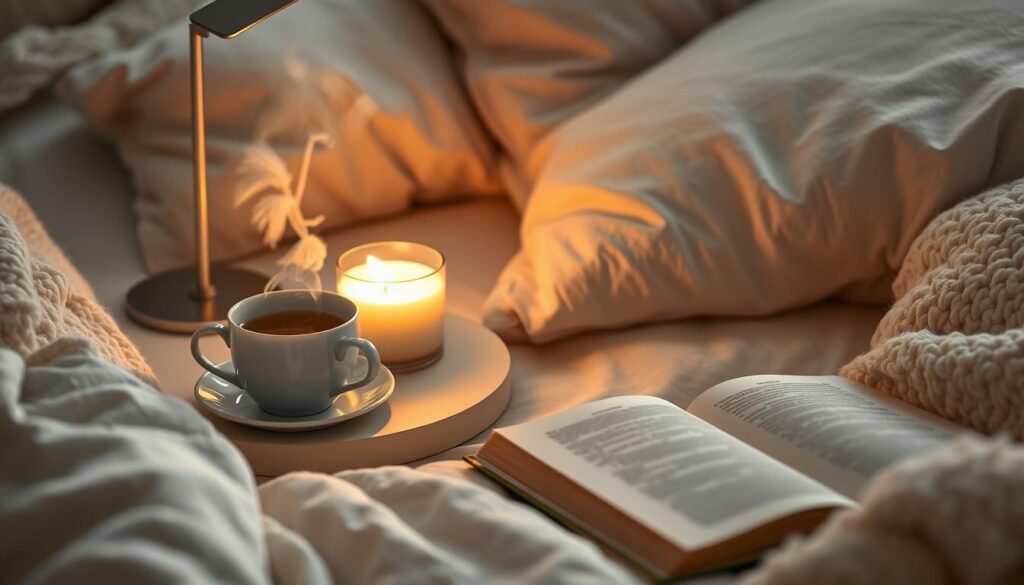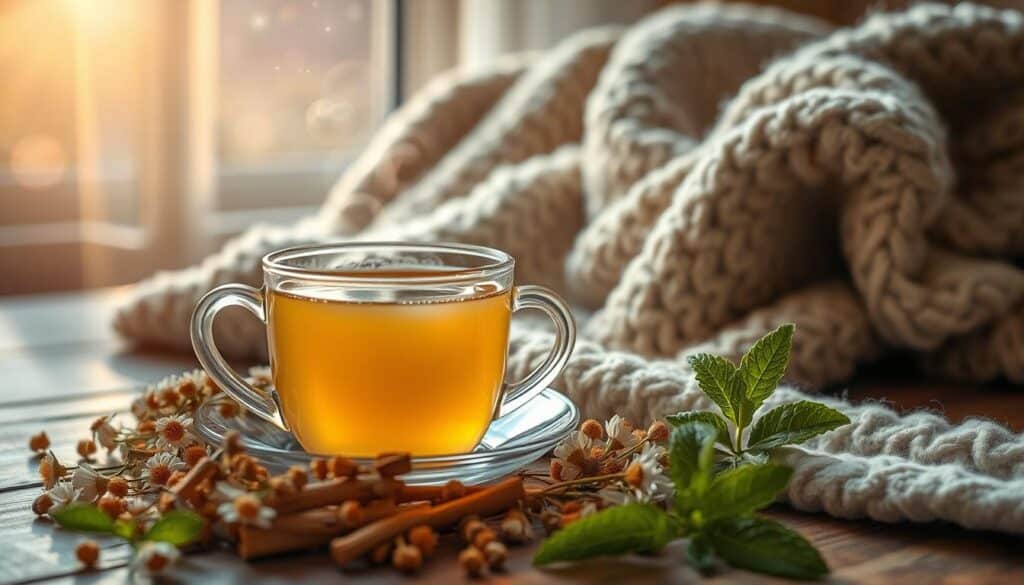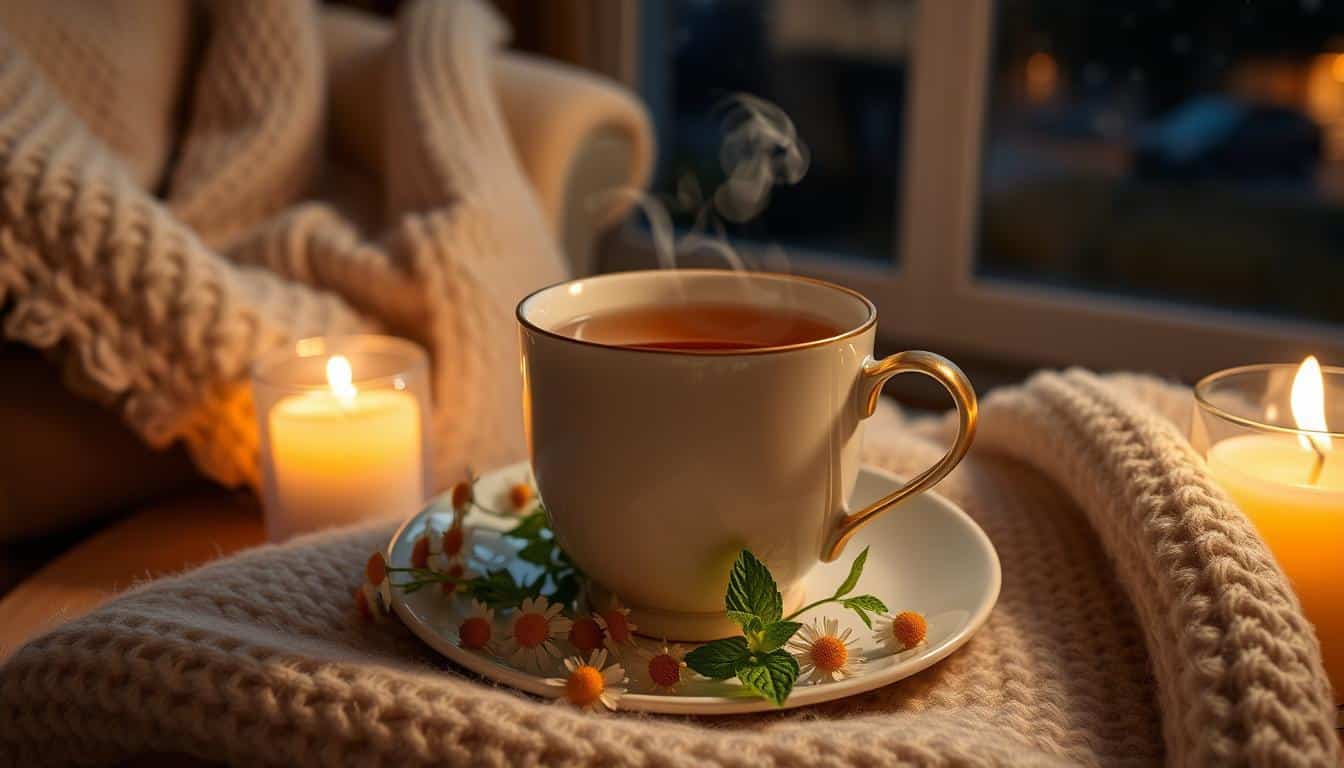Does Sleepytime tea really make you sleepy? You’re in luck! This soothing herbal tea is popular among those seeking a natural way to relax before bedtime. In this article, we’ll explore whether Sleepytime tea truly helps you drift off to sleep, how its ingredients affect your body, and answer your burning questions like, “How long does it take to work?”
Whether you’re new to herbal teas or looking to enhance your bedtime routine, there’s plenty to discover about Sleepytime tea. Let’s dive in!
Understanding the Science Behind Sleepytime Tea
Sleepytime tea combines herbs known for calming effects. Chamomile is the main ingredient, with apigenin that helps you relax and sleep. This antioxidant works by binding to brain receptors.How Herbal Ingredients Affect the Nervous System
Valerian root is another key part of Sleepytime tea. It calms the nervous system. Together, these herbs make you feel relaxed, helping you sleep better.The Role of Neurotransmitters in Sleep
Neurotransmitters like serotonin and melatonin control sleep. Chamomile and valerian roots help balance these chemicals. This aids in a natural sleep cycle.Scientific Studies and Evidence
Research supports Sleepytime tea’s effectiveness. A 2016 study showed chamomile tea improved sleep and reduced depression in new mothers.“Chamomile tea contains apigenin, an antioxidant that binds to specific brain receptors, promoting sleepiness and relaxation.”
Key Ingredients in Sleepytime Tea and Their Benefits
Sleepytime tea is a favorite for its ability to relax and help you sleep better. Its natural ingredients work together to ease you into a peaceful sleep.Chamomile: The Primary Sleep-Inducing Component
Chamomile is the main ingredient in Sleepytime tea. This flower has a compound called apigenin. It calms your brain, helping you sleep better and fight insomnia.Valerian Root: Nature’s Sedative
Valerian root is also in Sleepytime tea. It’s known for helping people sleep faster and sleep better. It boosts GABA in the brain, making you feel calm and sleepy.Other Essential Herbs and Their Effects
Sleepytime tea also includes herbs like passionflower, lemon balm, spearmint, and lemongrass. These herbs help reduce stress and boost dopamine. They make you feel relaxed, making it easier to fall asleep. Together, these herbs in Sleepytime tea offer a natural way to improve your sleep. They do this without the side effects of other sleep aids.Does Sleepytime Tea Make You Sleepy?
Sleepytime tea is a well-known natural sleep aid. But does it help you sleep? The answer is in the science of its ingredients and their sleep benefits. The herbs in Sleepytime tea, like chamomile, valerian root, and magnolia, help relax the body for sleep. Studies show these herbs may calm the brain, helping with anxiety and stress.| Ingredient | Potential Sleep Benefits |
|---|---|
| Chamomile | Contains apigenin, an antioxidant that may bind to certain receptors in the brain, promoting sleepiness and reducing insomnia. |
| Valerian Root | Traditionally used to aid in falling asleep faster and achieving better-quality sleep, though research on its effectiveness is mixed. |
| Magnolia | Can reduce adrenaline levels, making it an ideal ingredient for natural sleep aids for individuals experiencing stress or anxiety. |
| Green Tea (low-caffeine) | Contains theanine, an amino acid that can help reduce stress-related hormones and promote relaxation in the brain. |
| Lavender | By reducing cortisol levels, lavender can assist in having a more restful sleep and calm the brain, increasing dopamine production. |
| Passionflower | Has a calming effect that helps individuals fall asleep faster and possesses properties to reduce insomnia and anxiety. |
The Relationship Between Bedtime Rituals and Sleep Quality
Creating a bedtime routine can greatly improve your sleep. Activities like drinking warm Sleepytime tea help your body relax. This signals it’s time to sleep.Creating an Effective Night-Time Routine
An effective bedtime ritual includes calming tasks. These help your body and mind get ready for sleep. Tasks might include:- Taking a warm bath or shower
- Engaging in light stretching or meditation
- Turning off electronic devices and dimming the lights
- Reading a book or listening to soothing music
- Enjoying a cup of Sleepytime tea
Timing Your Tea Consumption
Timing is key when drinking Sleepytime tea. Stop drinking liquids two hours before bed to avoid sleep issues. Steeping the tea longer makes it stronger, helping you relax. Drinking Sleepytime tea after exercise is great. It combines the benefits of exercise with the tea’s calming effects. This mix leads to a good night’s sleep, making you feel refreshed in the morning.| Brand | Key Ingredients | Caffeine Content |
|---|---|---|
| Pukka Night Time Blissful Rest | Oat flowering tops (30%), lavender flower (14%), lime flower (10%) | Caffeine-free |
| Yogi Tea Bedtime Ayurvedic Blend | Fennel (31%), chamomile flowers (17%), peppermint (13%) | Caffeine-free |
| Celestial Seasonings Sleepytime Infusion | Chamomile, spearmint, lemongrass, tilia flowers | Caffeine-free |

Different Types of Sleep-Promoting Teas
Looking for a natural way to sleep better? Many herbal teas can help. From magnolia tea to lavender tea, each has special properties to calm you down and help you sleep. Magnolia tea lowers adrenaline, making you feel calm. Green tea, with less caffeine, has theanine that relaxes you. Chamomile tea is famous for its apigenin, which might make you sleepy. Lavender tea is soothing, thanks to lavender’s calming scent. Valerian tea helps you fall asleep quickly. Passionflower tea calms you down, easing insomnia and anxiety. These teas offer natural ways to improve sleep. By trying different teas, you can find the best one for your bedtime routine.| Tea Type | Key Ingredient | Potential Benefits |
|---|---|---|
| Magnolia Tea | Magnolia Bark Extract | Lowers adrenaline levels, promotes calmness |
| Green Tea | Theanine | Contains a relaxing amino acid |
| Chamomile Tea | Apigenin | Binds to receptors in the brain that may induce sleepiness |
| Lavender Tea | Lavender | Reduces cortisol levels, induces relaxation |
| Valerian Tea | Valerian Root | Aids in falling asleep faster |
| Passionflower Tea | Passionflower | Has a calming effect, alleviates insomnia and anxiety |
How Long Does It Take for Sleepytime Tea to Work?
Wondering how long it takes for Sleepytime tea to help you relax? It depends on a few things. However studies show that tea with chamomile usually starts working in 30-45 minutes.Optimal Timing for Maximum Effects
For the best results, drink Sleepytime tea before bed. This lets your body absorb the herbal goodness. Chamomile and valerian roots can then help calm your nervous system.Factors Affecting Tea’s Effectiveness
- How you react to herbal ingredients can vary. It depends on your body and how it processes things.
- Your health and sleep habits also play a role. Stress, medical conditions, and a regular bedtime routine can affect how well the tea works.
- How much tea you drink and when can also matter. Drinking it too late or in small amounts might not have as big of an impact.

Potential Side Effects and Safety Considerations
Herbal teas like Sleepytime tea are usually safe. But, some people might feel mild side effects from the ingredients. Valerian root, found in many sleep teas, can sometimes lead to headaches, dizziness, and stomach problems. Pregnant women should be careful with natural remedies like Sleepytime tea. Ingredients like chamomile and lemongrass might not be safe during pregnancy. Also, people with allergies to certain plants should check the tea’s ingredients before drinking. It’s a good idea to talk to a healthcare provider before drinking Sleepytime tea regularly. This is especially true for those with health conditions. It helps make sure the tea is safe and works well for you.Ingredient Considerations
- Valerian root may cause headaches, dizziness, and stomach problems in some users.
- Chamomile and lemongrass should be avoided during pregnancy due to uncertain safety.
- Individuals with plant allergies should check the tea’s ingredients carefully.
Healthcare Provider Consultation
Talking to a healthcare provider about Sleepytime tea is a good idea. This is especially important for those with health conditions or concerns. It helps ensure the tea is safe and effective for you.| Study | Key Findings |
|---|---|
| 2016 study on new mothers | Mothers who drank chamomile tea daily for two weeks slept better and had fewer signs of depression compared to non-tea drinkers. |
“Proper alternatives like Vitamin B6 or doxylamine are advised for managing morning sickness during pregnancy.”
Natural Alternatives to Sleepytime Tea
Sleepytime tea is a favorite for those seeking natural sleep help. But, there are other herbal options and lifestyle changes that can aid in better sleep. Almond milk and cherry juice are just a few examples that can help you relax and sleep well.Other Herbal Sleep Solutions
Many herbal supplements can help you sleep. These include valerian, chamomile, lemon balm, and passionflower. Studies show they can improve sleep quality and reduce insomnia symptoms. These herbal formulas come in easy-to-use capsules. They work by calming the nervous system. This helps you fall asleep quicker and sleep more deeply.Lifestyle Changes for Better Sleep
Simple lifestyle changes can also improve your sleep. Keeping a regular sleep schedule and creating a calm sleep space are key. Managing stress is also important for better sleep.- Establish a regular bedtime routine and stick to it, even on weekends.
- Limit exposure to blue light from screens before bed and ensure your bedroom is cool, dark, and quiet.
- Practice stress-reducing activities like meditation, yoga, or deep breathing exercises to unwind before bed.
Conclusion
Sleepytime tea can help with sleep for many people. It has herbs like chamomile and valerian root that relax you. But, it’s not a fix for all sleep problems and should be part of a good sleep routine. If you have ongoing sleep issues, see a doctor. They can find the cause and suggest treatments. Herbal teas like Sleepytime are helpful, but might not solve all sleep problems. Using Sleepytime tea can be good for your bedtime routine. But, it’s key to also have other healthy sleep habits. This includes a regular sleep schedule and a calm sleep space. Together, these can help you get the sleep you need.FAQ
Does Sleepytime tea make you sleepy?
Sleepytime tea’s ingredients like chamomile and valerian root can calm your nervous system. This helps you feel sleepy. Studies show these herbs can also improve your sleep quality.
How do the ingredients in Sleepytime tea affect the body?
The main ingredients in Sleepytime tea, such as chamomile and valerian root, affect sleep-related neurotransmitters. They have a relaxing effect on the nervous system. This helps you relax and get ready for sleep.
What are the main ingredients in Sleepytime tea and what are their benefits?
Sleepytime tea includes chamomile, valerian root, passionflower, lemon balm, spearmint, and lemongrass. Chamomile’s apigenin promotes sleepiness. Valerian root helps you fall asleep faster and sleep better. Lavender and passionflower also calm you down.
How effective is Sleepytime tea in promoting sleep?
Research shows Sleepytime tea can help you relax and sleep better. But, it might not work the same for everyone. It’s best used as a bedtime routine to improve sleep hygiene.
How should Sleepytime tea be consumed for the best results?
For the best results, drink Sleepytime tea as part of a bedtime routine. Wait 30-45 minutes for the herbs to work. Avoid drinking liquids before bed to prevent waking up. Brew the tea strong to get more of the active compounds.
What other types of sleep-promoting teas are available?
Besides Sleepytime tea, there’s magnolia tea, low-caffeine green tea, chamomile tea, lavender tea, valerian tea, and passionflower tea. Each has unique properties to help you relax and sleep better.
How long does it take for Sleepytime tea to work?
Sleepytime tea with chamomile takes about 30-45 minutes to work. Drink it well before bed to let your body process the herbs.
Are there any side effects or safety concerns with Sleepytime tea?
Sleepytime tea is usually safe but can cause side effects like headaches or stomach issues. Pregnant women and those with allergies should be careful. Always talk to a healthcare provider before using Sleepytime tea regularly, especially if you have health issues.
What are some natural alternatives to Sleepytime tea?
Natural alternatives include almond milk, cow’s milk, and cherry juice, which can help you sleep. You can also try herbal supplements with valerian, chamomile, lemon balm, and passionflower. Changing your lifestyle, like keeping a regular sleep schedule and managing stress, can also improve your sleep without relying on sleep aids.

